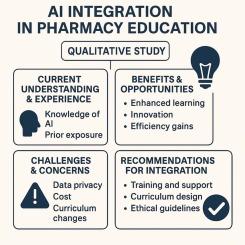Perspectives on artificial intelligence use in pharmacy education in Northern Ireland: A qualitative study based on the unified theory of acceptance and use of technology
IF 1.4
Q3 EDUCATION, SCIENTIFIC DISCIPLINES
引用次数: 0
Abstract
Introduction
Artificial intelligence (AI) is transforming healthcare education; however, its integration into pharmacy curricula requires further exploration. This study aimed to explore the acceptance of AI-based technology in pharmacy education through the extended Unified Theory of Acceptance and Use of Technology (UTAUT) framework and identify opportunities for responsible integration via improved AI literacy.
Methods
A qualitative study was conducted at the School of Pharmacy and Pharmaceutical Sciences, Ulster University, Northern Ireland, United Kingdom, in April 2025. Eight MPharm students were recruited through purposive sampling, with two participants from each of the four academic years (Years 1–4) to ensure representation of developmental perspectives. Informed by the extended UTAUT framework, semi-structured interviews were conducted via Microsoft Teams. Thematic analysis was conducted using Braun and Clarke's six-phase approach, with data management performed using NVivo 13.
Results
Four major themes emerged from the analysis: (1) Current Understanding and Experience with AI Tools, (2) Perceived Benefits and Opportunities, (3) Challenges and Concerns, and (4) Recommendations for Responsible AI Integration. Students demonstrated a developmental progression in AI use, from basic concept clarification in the first year to complex clinical reasoning applications in senior years. Students primarily discovered AI tools through informal networks rather than formal academic channels. Key benefits included immediate conceptual clarification across multidisciplinary subjects, enhanced academic efficiency, and support for clinical preparation through simulated patient interactions. However, concerns were expressed regarding regional context limitations, accuracy and reliability issues, potential impacts on critical thinking development, uncertainties related to academic integrity, and affordability constraints for premium features.
Conclusion
The findings reveal that students resourcefully use AI tools to enhance learning but navigate considerable challenges, including information inaccuracies, ethical uncertainties, and concerns about adverse impacts on critical thinking skills. Future recommendations include establishing clear institutional policies, implementing formal AI literacy training, developing UK-centric pharmacy-specific AI tools, and adopting scaffolded curriculum integration approaches.

人工智能在北爱尔兰药学教育中的应用:基于技术接受和使用统一理论的定性研究
人工智能(AI)正在改变医疗保健教育;但其与药学课程的整合还需进一步探索。本研究旨在通过扩展的技术接受和使用统一理论(UTAUT)框架,探索药学教育对基于人工智能的技术的接受程度,并通过提高人工智能素养来确定负责任的整合机会。方法于2025年4月在英国北爱尔兰阿尔斯特大学药学院进行定性研究。通过有目的的抽样,我们招募了8名药学硕士学生,每个学年(1-4年级)有两名参与者,以确保发展观点的代表性。根据扩展的UTAUT框架,通过Microsoft Teams进行了半结构化访谈。使用Braun和Clarke的六阶段方法进行主题分析,使用NVivo 13进行数据管理。分析产生了四个主要主题:(1)当前对人工智能工具的理解和经验;(2)感知到的好处和机遇;(3)挑战和关注;(4)负责任的人工智能集成建议。学生们展示了人工智能应用的发展过程,从第一年的基本概念澄清到大四的复杂临床推理应用。学生们主要是通过非正式的网络而不是正式的学术渠道发现人工智能工具的。主要的好处包括跨多学科的概念澄清,提高学术效率,并通过模拟患者互动支持临床准备。然而,对于区域背景限制、准确性和可靠性问题、对批判性思维发展的潜在影响、与学术诚信相关的不确定性以及高级功能的可负担性限制,人们表达了担忧。研究结果表明,学生们机智地使用人工智能工具来加强学习,但也面临着相当大的挑战,包括信息不准确、道德不确定性以及对批判性思维技能不利影响的担忧。未来的建议包括制定明确的制度政策,实施正式的人工智能扫盲培训,开发以英国为中心的特定于药房的人工智能工具,以及采用框架式课程整合方法。
本文章由计算机程序翻译,如有差异,请以英文原文为准。
求助全文
约1分钟内获得全文
求助全文
来源期刊

Currents in Pharmacy Teaching and Learning
EDUCATION, SCIENTIFIC DISCIPLINES-
CiteScore
2.10
自引率
16.70%
发文量
192
 求助内容:
求助内容: 应助结果提醒方式:
应助结果提醒方式:


